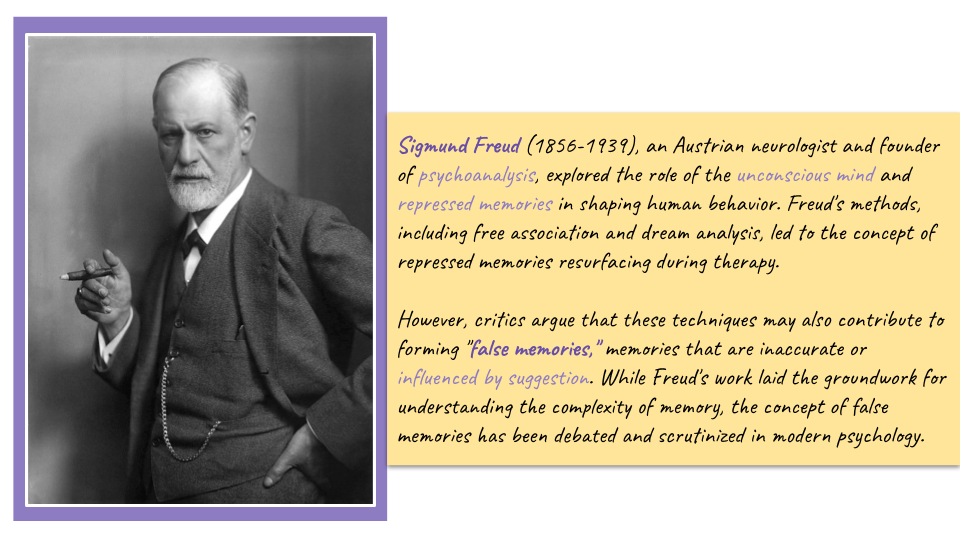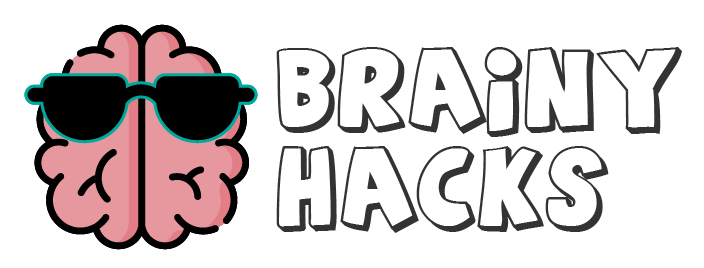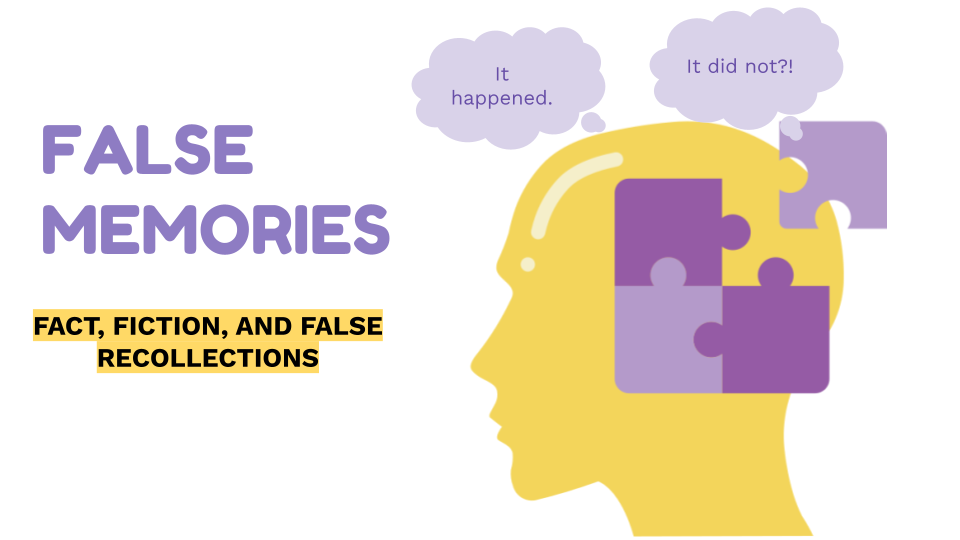Our brain, a wondrous organ, is like a cosmic archive, capturing our musings and cataloging life events akin to a high-tech video camera. Though it may seem that things are stored as they happened and can be recalled linearly, the playback isn’t always flawless. While there are different forms of memory that allow for progress from those first wobbly attempts at riding a bike, to hopping on with no second thought, or the ability to recalling drilled facts in seconds, our memory can play tricks on us when it comes to recalling certain events or memories. It’s as if a quirky glitch in the system leaves us questioning the accuracy of our recollections. Indeed, there are moments when memory plays so vividly that it convinces us every detail is an absolute truth.
Curiosity over false memory
Exploring the origins of false memories reveals their presence not only in significant life moments but also in our daily activities. Routine tasks, like locking the front door, placing car keys on a shelf, or leaving a coffee on a desk, can be etched in our minds with unwavering confidence. Yet, upon returning to these scenes later, we often find discrepancies – doors left unlocked, keys in different spots, and coffee missing. We’re left pondering, “Did I actually lock the door? Was the coffee ever on my desk?” These instances, classified as false memories, involve recalling events with a strong sense of certainty despite factual inaccuracies, whether partial or complete. (Here’s a bonus read on how our routine tasks are etched in our minds effortlessly, explaining implicit memory.)
In psychology, it turns out that false memories are not exclusive to a select few but a universal phenomenon that has intrigued researchers since the days of Freud. Now, before you start fretting about unintentional deception or malicious intentions, let me put your mind at ease. Most of our false memories aren’t the result of scheming minds out to take advantage. Instead, they’re subtle distortions quietly unfolding in the recesses of our brains, driven by a myriad of motivations like misinformation, misattribution, emotions, and the persuasive power of suggestion.
Our journey into the enigmatic landscape of the mind was pioneered by the unorthodox neurologist Sigmund Freud, who, in the late 19th century, alongside Josef Breuer, delved into the then-unexplainable mysteries in their groundbreaking “Studies of Hysteria” (1895). While not explicitly focused on false memories, Freud and Breuer introduced the concept of catharsis – a therapeutic technique aimed at releasing repressed emotions and memories to alleviate psychologically induced symptoms like amnesia and paralysis.

Unsurprisingly, Freud’s unconventional approach has drawn its fair share of criticism from contemporaries. His psychoanalytic method aimed to unearth repressed memories shoved into the unconscious mind where psychology believes they influence behavior. However, this probing can inadvertently lead individuals to construct false memories.
Although Freud’s study doesn’t extensively dwell on false memory syndrome, his controversial research sparked wider conversations about the pliability of memory. His work raised questions about how the concealed traumas within our minds might be susceptible to suggestion.
Still with me? Great, let’s unravel more of this mystery.
How common are false memories
Alright, let’s add a touch of fun to the atmosphere, shall we? Remember that time (or maybe not, thanks to the potential false memory alert)… Let’s put our recollections to the test. Picture this: the inaugural moment you brought your first boyfriend or girlfriend to the sacred grounds of your parent’s house. There they were, sitting in the living room, flipping through the family photo album while your mother or grandmother narrated the epic (and mortifying) sagas of your childhood. It’s a scenario so common it’s practically a rite of passage, even if it means cringing at those embarrassing photos – you know, the ones with the missing front teeth or the epic first encounter with Santa after enduring an endless mall line.
Much like a seasoned documentarian armed with a camera, mothers and grandmothers have a knack for turning our past into a slide show marathon. They can recount tales for hours, not to shame us, but to revel in the nostalgia of our precious moments. Oddly enough, the cringe-worthy parts, akin to an iPhone Retina display in their clarity, often appear as fuzzy patches in our own memory. So, when we dismissively claim those stories aren’t entirely accurate, it’s only a matter of time before we find ourselves sharing those same embarrassing yet amusing childhood tales with new friends or potential life partners, just like our maternal figures.
As we play the storyteller and replay these memories like a mental slideshow, there’s a notable risk of memory fallacy, as revealed by Elizabeth Loftus’ research. Approximately 25% of individuals might end up with distorted post-event information due to suggestions. It’s a 1:4 chance, but let’s not get too serious – after all, these stories, whether entirely accurate or slightly embellished, are meant for laughter. So, if it’s all in good fun, why doubt it? Laughter is the ultimate reward, isn’t it?
In contrast to the lighthearted tales of childhood antics, the origins of false memories took a notably serious turn—bordering on criminal seriousness! Through the annals of psychotherapy, particularly Freud’s contentious use of hypnosis to retrieve traumatic memories in young females following accusations of sexual abuse, 20th-century studies in both psychology and neurology underscore a significant concern. These studies indicate that memories recovered through therapeutic methods may not be foolproof, especially in the context of legal proceedings.
Despite strides in scientific understanding, there is a lack of definitive techniques to ascertain the reliability of these recovered memories. Consequently, therapeutic practices aimed at memory recovery, such as hypnosis and guided meditation, remain contentious, sparking debates within legal and scientific circles.
Explore more about false memories in this quick Ted Ed watch, Are all of your memories real? – Daniel L. Schacter
Are you one to have false memories and how to deal
Ever wondered if you might be susceptible to the twists and turns of false memories? Well, don’t be afraid because most of us are, to varying degrees. However, some groups teeter on the edge of what’s known as false memory syndrome (FMS), and they include:
- Repressed Memories: FMS often involves memories believed to be repressed due to trauma, depression, or stress. The idea is that our minds might block out memories of particularly distressing events as a sort of psychological defense mechanism. This is especially relevant for individuals who have endured traumatic experiences, such as victims of child abuse.
- Controversial Legal Cases: Now, let’s zoom in on the legal arena. FMS has made its presence felt in cases where individuals level accusations of abuse or provide false witness accounts of accidents or crimes. Take a trip back to the mid-1980s in the United States, where a storm of highly publicized child abuse cases, often targeting day-care workers, unfolded. This era, famously dubbed the “Day-care sex abuse hysteria,” stirred panic fueled by media sensationalism. Despite a lack of concrete evidence, the hysteria left an enduring impact on how society perceived child safety, legal procedures, and therapeutic interventions. It’s a compelling illustration of how suggestion, whether intentional or unintentional, can seep into our minds, causing us to incorporate false information into our memories. This influence can occur in therapeutic settings, during interrogations, or even through the sway of media narratives.
Dealing with false memories might feel like navigating a maze, but fear not – there are some excellent strategies you can try out:
- Soul-searching and zen vibes: Take a moment to dive deep into the memory pool. Ask yourself the real questions, like, “Could this memory be playing tricks on me?” Channel your inner zen with mindfulness practices. Awareness of your thoughts and emotions can be a game-changer in spotting and tackling those sneaky false memories.
- Journaling and memory detective mode: Time to kickstart your journaling journey! Document your thoughts, feelings, and life adventures. It’s not just a diary; it’s your memory detective notebook. Track how your memories evolve and spot any funky thinking patterns. For bonus points, reach out to your memory buddies – those who were there when it all went down. Cross-referencing memories with your pals is like unlocking a secret level in the game of memory.
False memories – those tricky replays we’ve all danced with at some point! From chuckle-worthy childhood fantasies to the traumatic experiences we may be afraid to revisit, they’re part of memory mysteries. But here’s the plot twist: when these memory misfits start messing with our mental well-being or legal trouble, it’s time to call in the pros. Seeking professional guidance becomes a brave move. Ultimately, the goal is to foster self-awareness, critical thinking, and emotional resilience in managing and mitigating the impact of false memories.
References
- Nieman, J. (1996) The Diva of Disclosure: Elizabeth Loftus. Psychology Today.
- Santos, G., Costa, V. (2016) False memory syndrome: A review and emerging issues, following a clinical report. Science Direct.
Image & Video
- Sigmund Freud. Retrieved from: https://en.wikipedia.org/wiki/Sigmund_Freud#/media/File:Sigmund_Freud,_by_Max_Halberstadt_(cropped).jpg
- Ted Ed watch, Are all of your memories real? by Daniel L. Schacter

